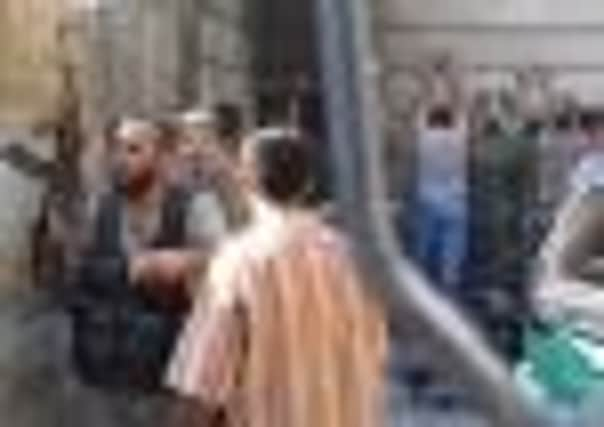Helicopters strike at Syrian rebels


Helicopter attacks on the central Salaheddine district of Aleppo were reported, as well as fighting elsewhere in the city. “Helicopters are participating in clashes at the entrance of Salaheddine district and bombarding it,” the Syrian Observatory for Human Rights said. “There are also violent clashes at the entrances to Sakhour district.”
One opposition activist said he had seen Syrian tanks and armoured carriers heading for Salaheddine.
Advertisement
Hide AdAdvertisement
Hide AdTurkey, once a friend but now a fierce critic of the Syrian government, joined growing diplomatic pressure on President Bashar al-Assad, calling for international action to deal with the military build-up.
The battle for the city of 2.5 million people is seen as a crucial test for a government that has committed major military resources to retaining control of its two main power centres, Aleppo and the capital Damascus, in the face of a growing insurgency.
While neither side has managed to gain the upper hand, the outcome of the uprising is being watched anxiously in the region and beyond, amid fears that sectarian unrest could spread to volatile neighbouring countries.
Military experts believe that while Assad’s more powerful military will overcome the rebels in Aleppo and other major cities, it risks loss of control in the countryside because the loyalty of large sections of the army is in doubt.
Three rebel fighters were killed in clashes before dawn yesterday in Aleppo, the Observatory said. It said 160 people were reported killed in Syria on Friday, adding to an overall death toll of around 18,000 since the uprising began. Video footage provided by the Observatory showed smoke rising over apartment blocks in the city into a hazy sky yesterday. The sound of sporadic gunfire could be clearly heard.
While attention has focused on Aleppo, fighting was also reported in towns across Syria: Deraa, the cradle of the revolution; Homs, the scene of some of the bloodiest combat; and Hama, where a revolt against Assad’s father in the early 1980s was suppressed with thousands of deaths.
At least ten people were killed yesterday when Syrian security forces went into Maadameyat al-Sham near Damascus.
United Nations secretary-general Ban Ki-moon said he was deeply concerned about reports that Syria could use chemical weapons and demanded that the government should state it would not use them “under any circumstances”.
Advertisement
Hide AdAdvertisement
Hide AdThe increase in fighting in Aleppo follows a bomb attack on 18 July that killed Assad’s defence minister and three other top officials in Damascus, a development that led some analysts to speculate that the government’s grip was slipping.
Since then, Assad’s forces have mounted a strong counter-attack against rebels in Damascus, as well as concentrating forces for an expected assault on Aleppo.
The rebels are outgunned by the Syrian forces, making it difficult for them to hold any territory for long. But the rebels’ run on Damascus and Aleppo suggests they could be gaining in power and organisation.
Saudi Arabia and other nations have spoken positively of arming the rebels, though no country is known to be doing so.
Saudi’s King Abdullah announced a national campaign to collect money for “our brothers in Syria” on 22 July, and yesterday the country’s press agency said Saudi donations had reached more than £45 million.
Major General Robert Mood, whose three-month mission in Damascus ended last week, said the situation in Syria is likely to remain unstable even if Assad’s government steps down.
“It’s impossible to imagine a future in Syria where the current people in power remain in power. So in that view, it’s just a matter of time before this regime collapses. And that is how it’s supposed to be,” Mood said.
That could happen, he added, if more members of the military simultaneously leave the ranks of the government to join the opposition.
Advertisement
Hide AdAdvertisement
Hide AdMeanwhile, Syria’s state-run TV said the army freed two Italian electrical engineers, along with two drivers and a Russian expert, who were captured eight days ago by militants.
The Italians were identified as Domenico Tedeschi, 36, and 64-year-old Oriano Cantani. The report said they worked at the Deir Ali power plant, 18 miles south of Damascus.
During a news conference in Damascus, Tedeschi said they were kidnapped by five or six masked men, who intercepted their car as they drove to the airport.
“After a checkpoint, we were stopped by those people whose faces were covered by black masks,” he said. “We were very, very afraid, because we don’t know anything.”
He said the men were robbed and then kept at a small villa.
“We think that a Syrian family was forced to keep us,” he said, noting that they heard the voices of women and children. “The Syrian army found us at midday on Friday.”